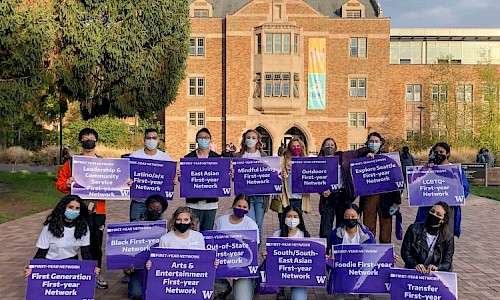
Full Article: Connecting, belonging, being well: Across UAA, programs welcome back students
The pack is back! For the first time since the transition to mostly virtual learning in March 2020, Huskies are crossing Red Square on their way to class. These Dawgs include two classes who are completely new to campus: incoming first-year students and second-year students, in addition to upperclassmen who’ve spent more than 18 months away from campus.
Student well-being is top of mind as programs across Undergraduate Academic Affairs are welcoming back our students. This work involves building community so students feel connected and a sense of belonging. It’s recognizing and addressing the increased stresses students may be experiencing as a result of the pandemic and the transition back to in-person learning. It’s programs incorporating resilience and mindfulness work to give students the tools to care for their mental health. It’s the dedication to meeting students where they are at. Programs are also maintaining some virtual programmatic offerings this year to increase students’ access to services. Read on to learn more about how programs throughout Undergraduate Academic Affairs are orienting and supporting students this autumn.
Cornerstones of First Year Programs’ (FYP) work are helping students learn about campus resources, build their community and understand how to navigate the UW. This work is rooted in the knowledge that students who feel connected to campus socially and academically are more likely to persist through college and earn their degree.
First-year networks are social groups run by peer leaders. The 14 networks’ themes range from shared interests, including mindful-living, foodies, to shared identities, such as East Asian and transfer students. Students are connected through a Discord (a group chatting platform), and are invited to various events and meetups, learn about academic support programs and most importantly meet a group of students with similar interests and shared identities, helping them establish a community at the UW. FYP surveyed students as they signed up for networks: 93% registered to make friends and 90% are seeking connections to students with shared interests.
Mindfulness and self-care is incorporated into each General Studies 199 class meeting, taught by First-year Interest Group Leaders. The goals of this are to help students understand mindfulness and its benefits. They explore mindfulness activities like journaling, meditation, 3-minute dance parties and breathing exercises.
Each FIG Leader brings in a LiveWell peer health educator to lead a seminar on one of four topics: mental health, coping with clouds, Sleepy Husky or physical health. The peer educators explore the science of the given topic and discuss how it connects to physical, mental and emotional health. One past participant commented, “The mental health seminar project was important to me since the pandemic has taken a toll on me when it comes to being motivated and isolated.” There is also great power in hearing peers talk about similar experiences, with another participant sharing, “Being able to have guest speakers talk about research, mental health and admissions was extremely valuable because it gave me more understanding for how the areas work. I don’t feel alone in the process of college.”

120 Mary Gates Hall Box 352825
Seattle, WA 98195-2825
Mary Gates Hall 120
Academic Year: Mon-Fri 9:00 a.m.– 4:00 p.m.
Summer: Mon-Thurs 8:00 a.m.– 4:30 p.m., Fri 8 a.m.–12 p.m.
Winter Break: Mon-Fri 9:00 a.m.–12:00 p.m.
Commuter and Transfer Commons (HUB 141)
Academic Year: Mon-Fri 8 a.m.–5 p.m.
Breaks & Summers: Closed
Closed during University holidays.
206-543-4905 (Voice)
206-207-5564 (Text)
Provide NSTP with anonymous feedback about our programs.
chat Submit feedback here